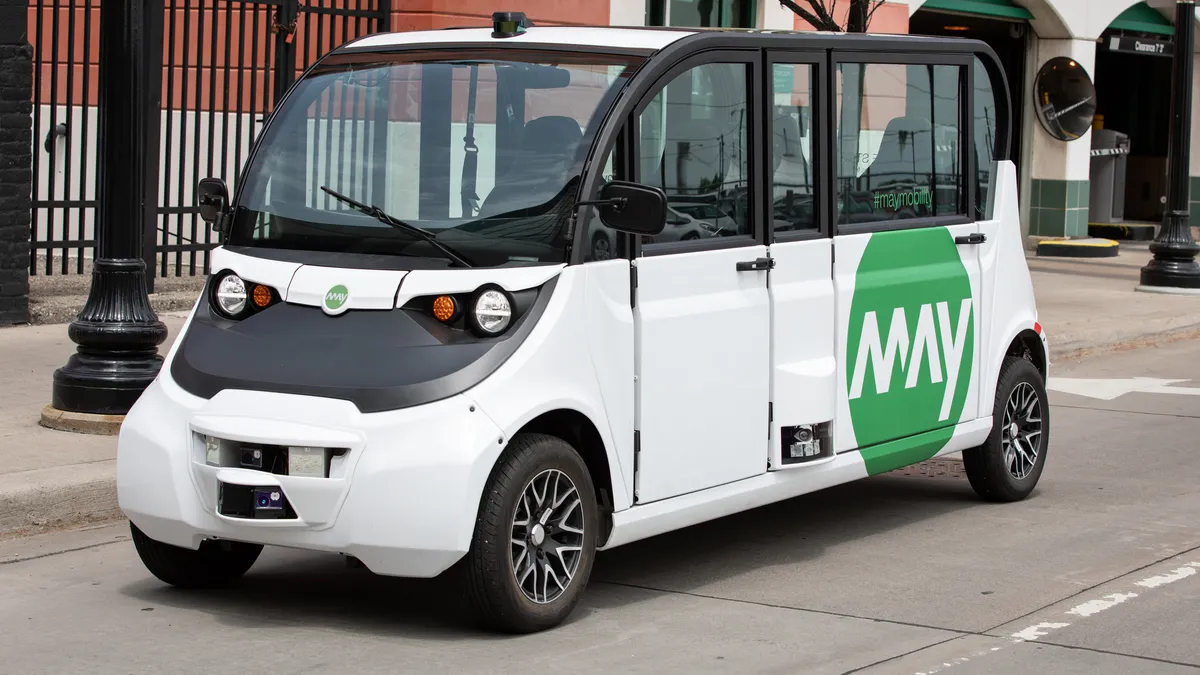Dive Brief:
- Autonomous shuttle service provider May Mobility raised $50 million in a Series B funding round, led by an undisclosed amount of money from Toyota Motor Corp. Other key investors include SPARX Group, Millennium Technology Value Partners, Cyrus Capital Partners, BMW iVentures and Toyota AI Ventures.
- The Transportation-as-a-Service (TaaS, sometimes known as Mobility-as-a-Service, or MaaS) company also announced a partnership with Toyota on autonomous TaaS opportunities. "What they see in May Mobility is a company that's out ahead figuring things out really fast and learning about how you build a transportation services company on autonomous vehicles," May Mobility CEO Edwin Olson told Smart Cities Dive. "They're partnering with us so they can learn from what we're learning and take advantage of all the agility a startup has to offer."
- May Mobility currently operates in Detroit; Grand Rapids, MI; and Providence, RI, and the new funding "gives us a change to grow and expand in a way that most AV (autonomous vehicle) companies don't get to do," Olson said. The funding will go toward hiring new engineering and operations employees as well as a fleet expansion.
Dive Insight:
This funding infusion comes less than a year after May Mobility raised $22 million in Series A funding. The company is pulling in support and looking to expand at a time when some shuttle service competitors are struggling, or even folding. Apple acquired self-driving shuttle startup Drive.ai just days before the TaaS provider planned to permanently close. And shuttle startup Chariot — which Ford purchased — ceased operations this year.
Olson says the secret sauce to May Mobility's success is being at the right scale, as well as embracing the right combination of technology and a customer-centric mentality.
"Some technology companies... are too focused on the technology and not thinking enough about the applications, the customers and the people who are actually going to pay for it... On the other hand, you've got people who completely get what the transportation problems are but can't make the economics work out because they don't have the technology. I see May Mobility as being in the sweet spot of having great technology... but also really thinking as a first-order constraint about who are the customers," he said.
May Mobility strives to meet the individual transportation needs of every community in which it operates, Olson said. For some, that might be providing shuttle service for commuters heading to a train or light rail. For others, it might be more flexible transportation along lesser-used bus routes.
The company is not ready yet to disclose further details about the partnership with Toyota or which cities might be considered for future ventures. But the partnership will be mutually beneficial for advancing both companies' AV ambitions.
"Toyota is a forward-looking company. They are trying to figure out how their business model is going to evolve over time," Olson said. "The synergy here is that we may be the forward-scouting element — the ones out in front learning — but we've got this massive strategic resource behind us now that knows how to do mobility services and has vehicles... which positions us to be incredibly successful over time."
Olson wouldn't speculate about whether this move could lead to a wider trend of large auto manufacturers partnering with shuttle startups. But he did note that some OEMs go another way and merely advance their own ventures, or they invest too heavily in transportation startups, which "destroys their start-uppy feeling" and eliminates the agility benefit of working with a startup.
Still, this move is in line with a recent string of OEM investments in other types of innovative transportation besides the traditional combustion-engine personal vehicle. The many partnerships include: Volkswagen and Ford's investment in startup Argo AI to advance AVs, electric vehicles and other mobility services; Toyota's investment in Uber to advance its AV business; and Volvo's investment in LiDAR sensor maker Luminar. That's on top of the expansion into alternative mobility modes such as Ford's acquisition of dockless e-scooter company Spin.












